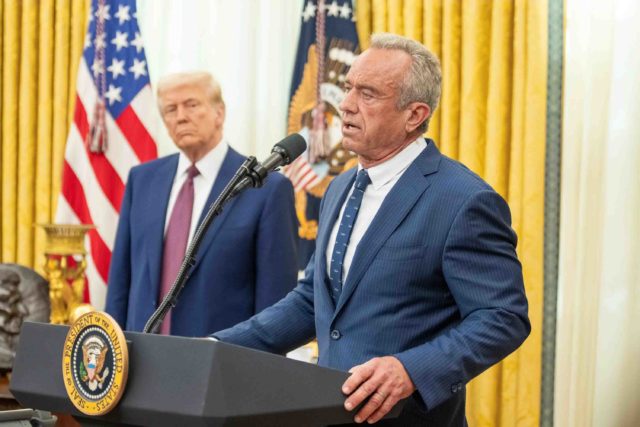UCLA researchers and policy experts said United States Secretary of Health and Human Services Robert F. Kennedy Jr. lacks qualifications for his role and could derail American research and public health efforts.
Kennedy took office Feb. 13 as the 26th HHS secretary after then-President-elect Donald Trump named him for the role in November. The nomination sparked controversy among government officials and scientists.
The U.S. Department of Health and Human Services is a department of the federal government created to protect the health of Americans and provide essential health services, according to its website.
The HHS secretary oversees the funding and implementation of programs, research and initiatives that align with the HHS’ goals, including Medicare, Medicaid and the National Institutes of Health. The secretary also leads responses to public health emergencies and has the authority to create new health programs.
Throughout the confirmation process, Kennedy faced pushback from both major political parties, creating uncertainty as to whether he had enough votes for confirmation. Many Democrats have been critical of his previous claims about vaccines, while some Republicans have looked to his past support of abortion as a point of criticism, according to CBS.
Mark Peterson, a professor of public policy, political science and law at UCLA, said the nomination of Kennedy came about as a product of an unprecedented political landscape.
“It is a nomination that under normal political circumstances in the United States would never be conceivable,” Peterson said. “He doesn’t have either the background or the expertise or the orientation that would be suitable.”
He added that he believes Kennedy will be primarily driven by his personal views in his decision-making.
Burt Cowgill, an associate professor in residence of health policy and management at UCLA, said he believes Kennedy struggled to answer questions related to Medicare and Medicaid during his confirmation hearing. Kennedy confused the two programs at times and spoke incorrectly about the sources of funding for Medicaid, as well as the costs imposed on those who use Medicaid, according to The New York Times.
“I teach our first-year master’s in public health students about Medicare and Medicaid,” Cowgill said. “We just got through it the week before. I asked them the same questions that he was asked, and they all knew them with flying colors.”
Richard Jackson, a professor emeritus at the Fielding School of Public Health, said he does not believe being the HHS secretary requires having a technical background in the sciences – but added that the secretary must be open to receiving information from those who do. Donna Shalala, the longest-serving HHS secretary, served for eight years despite not having a medical background, he said.
Although Kennedy has said he is not anti-vaccine, he has made false claims about vaccines in the past – including spreading the debunked claim that there is a link between vaccines and autism, according to the Associated Press.
Jackson said he cannot support Kennedy because of his views on vaccination.
“I cannot in any way support someone who’s opposed to immunization,” Jackson said. “It has saved millions of lives in our country, and I don’t think a secretary of HHS should be opposed to immunization.”
Kennedy has also publicly spoken about his concerns regarding fluoride levels in water and about the processed foods and additives that are part of the American diet, according to Reuters. Jackson said he has also had concerns about these subjects but emphasized that public health is very nuanced.
Peterson said he believes Kennedy may change the focus of the NIH’s research, particularly by disregarding the impact of epidemiological and biomedical research.
“He has argued again that biomedical research, epidemiological research – it’s been too big of an investment of NIH, and NIH dropped most of that research, which is extremely significant in the development of medical procedures and treatments over the last several decades,” he said.
Jackson also said that as director of the National Center for Environmental Health in Atlanta at the Centers for Disease Control and Prevention, he remembered speaking to the head of a lab once who told him that people, more specifically their skill sets, are the most important.
“It takes years to train people that are really adept at handling such sophisticated instruments, and the recruiting and development of these people is the most critical thing,” he said. “You can always order another machine – if you got the money – but you have to have a pipeline, a supply line of really smart, effective, hardworking professional people that can manage these things.”
Cowgill said many decisions being made under the new administration are unprecedented and have the capability to change not only health care but the entire structure of the government.
“This isn’t only a critical time in health care and health care research but also in how our government functions – in how the executive, legislative and judicial branch interact with the best interests of the people in mind,” Cowgill said.






Comments are closed.